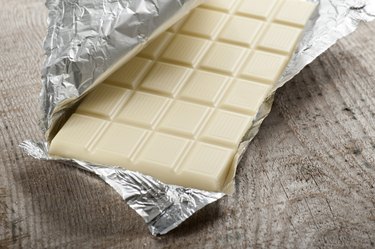
Many people claim they are addicted to chocolate and need their daily fix. Those with a guilty conscience say that chocolate is a healthy treat. However, white chocolate does not have the same ingredients nor does it confer the same health benefits as other types of chocolate.
Ingredients
Video of the Day
The basic ingredients used in the preparation of white chocolate are sugar, cocoa butter, milk, soy lecithin and natural or artificial flavors. Technically, white chocolate is not really chocolate because it lacks cocoa solids or cocoa powder. Milk chocolate, for example, contains about 30 percent to 40 percent cocoa solids, while dark chocolate contains a minimum of 50 percent up to 85 percent cocoa.
Video of the Day
The Missing Ingredient: Cocoa
White chocolate does not provide the benefits of cocoa, because it doesn't contain any. Moreover, white chocolate is loaded with added sugar. Replace white chocolate with dark chocolate that is at least 70 percent to 85 percent cocoa. Dark chocolate contains more antioxidants and other compounds that can help lower blood pressure, improve insulin sensitivity and protect the health of blood vessels better than white chocolate, as reported in the March 2005 issue of the "American Journal of Clinical Nutrition."
Nutrition Facts
White chocolate contains 151 calories, 9 grams of fat, 5 grams of saturated fat, 17 grams of carbohydrates, no fiber, and 1 gram of protein per 1-ounce square. Milk chocolate has exactly the same amount of calories per serving, with about the same amounts of the different nutrients. Dark chocolate containing between 70 percent and 85 percent cocoa contains slightly more calories, more fat, more protein, more fiber and fewer carbohydrates -- approximately 167 calories, 11.9 grams of fat, 6.9 grams of saturated fat, 12.9 grams of carbohydrates, 3.1 grams of fiber and 2.2 grams of protein per ounce.
Sugar
White chocolate has 17 grams of sugar per ounce. Because 1 ounce is equivalent to approximately 28 grams, this means that more than 60 percent of white chocolate is actually sugar. However, the more cocoa solids in a chocolate, the less sugar it contains. About half of milk chocolate is sugar, with 14.4 grams of sugar per ounce; while dark chocolate containing 70 percent to 85 percent cocoa has 6.7 grams of sugar, which corresponds to less than 25 percent of its weight.
Quality
Good-quality white chocolate uses cocoa butter as its main source of fat. However, cheaper versions may use palm oil or other cheap fats instead. Look at the ingredients and nutrition facts label carefully to ensure your white chocolate does not contain any trans fat.
- Chocolate: Chocolate By The Numbers
- Chocolates Online: Ingredients
- American Journal of Clinical Nutrition: Short-Term Administration of Dark Chocolate is Followed by a Significant Increase in Insulin Sensitivity and a Decrease in Blood Pressure in Healthy Persons
- Nutrition Reviews: The Emerging Role of Flavonoid-Rich Cocoa and Chocolate in Cardiovascular Health and Disease; Engler M.B. and Engler M.M.; March 2006
- USDA National Nutrient Database: Candies, White Chocolate
- USDA National Nutrient Database: Chocolate, Dark, 70 to 85 Percent Solids
- USDA National Nutrient Database: Candies, Milk Chocolate
- Circulation: Cocoa and Cardiovascular Health